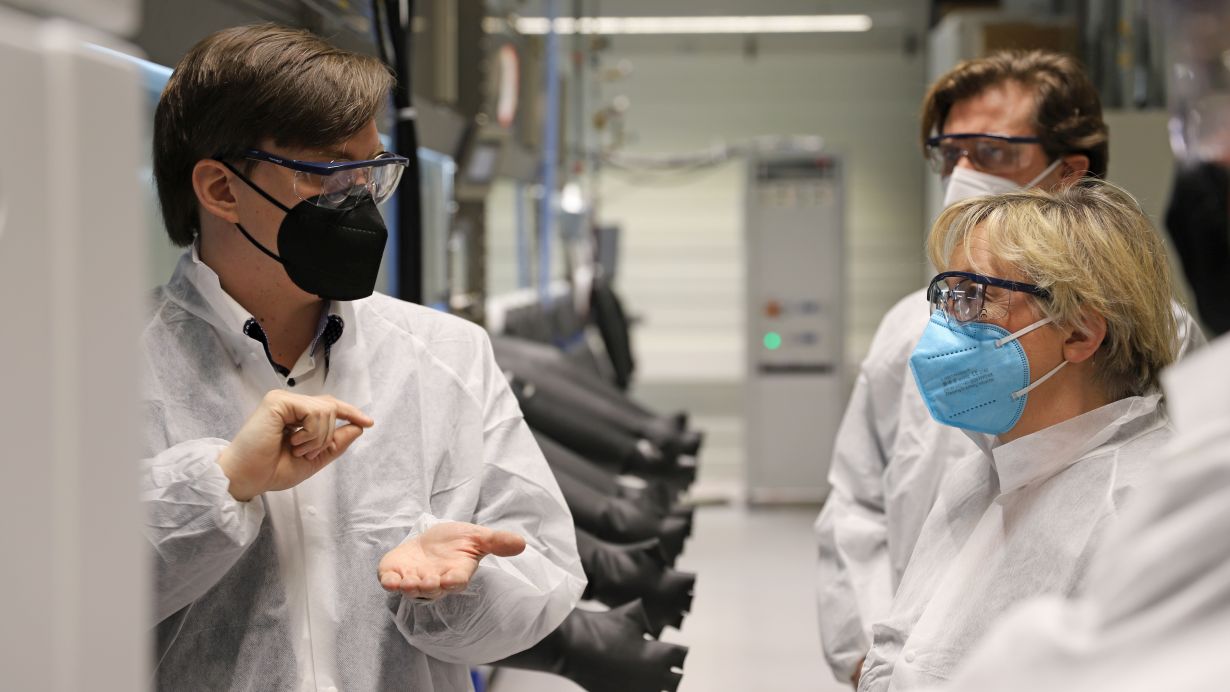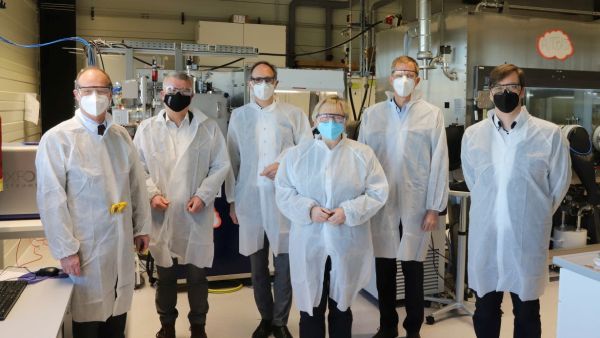
Building batteries all around the clock, analyzing thousands of interfaces, evaluating the results autonomously with the help of artificial intelligence (AI), and planning the next experiment: A new facility of the POLiS Cluster of Excellence deals with material development in a fully automatic and digital way. The autonomous research laboratory has been established by Karlsruhe Institute of Technology (KIT) in cooperation with Ulm University and the Helmholtz Institute Ulm (HIU). Its commissioning took place in the presence of Baden-Württemberg Science Minister Theresia Bauer.
Transformation of the transport and energy sectors requires novel efficient and sustainable batteries. This is a big challenge, as it presently takes decades to develop an idea to a mature product with existing methods. A new high-tech facility of POLiS will considerably accelerate this process. POLiS, a Cluster of Excellence, in which KIT and Ulm University work on future batteries, developed this facility. "This new material development platform is the world's only research infrastructure of this kind. We hope that it will very much push research into energy storage systems, which will be indispensable for transforming our energy and mobility sectors. Moreover, we succeeded in recruiting Professor Helge Stein, a highly creative and active mind, for our team in Ulm," said Theresia Bauer, Baden-Württemberg Minister for Science, Research, and the Arts, during her visit of POLiS and HIU on the occasion of the lab's commissioning.
The World's First Fully Integrated Platform for Accelerated Research into Electrochemical Energy Storage
Helge Stein, tenure-track professor at KIT and POLiS Research Unit Spokesperson, explains the advantages of the facility: "We are now in a position to automatically synthesize and assemble batteries and their components and to automatically start and evaluate a measurement. Based on the data, the AI-assisted facility can even decide which experiment is to be carried out next." Together with his team, Stein has developed underlying processes for combinatorial material synthesis and high-throughput characterization as well as data mining techniques using AI methods for experiment evaluation and planning. The facility named PLACES/R (Platform for Accelerated Electrochemical Energy Storage Research) is the first fully integrated platform for accelerated research into electrochemical energy storage worldwide.
New Paradigm for Battery Material Development
Battery research is determined by the search for the ideal combination of materials, their composition, and process technologies. Testing all possible variations of all materials, however, would take thousands of years with classical methods. "Our facility can test several hundreds of such variations every day. This corresponds to about the average life's work of a researcher," Stein says. Having accelerated the process by automation, use of algorithms and AI additionally speeds up optimization by a factor of ten. In this way, promising battery concepts can be developed to maturity at higher speed and lower cost.
The new research facility is embedded in European collaboration. The data collected from all areas of the battery development cycle are shared with 34 institutions from 15 countries within the BIG-MAP project of the BATTERY2030+ European research initiative. "The fully automatic laboratory will enable us and our European partners to develop components for new batteries far more rapidly. It will also ensure that batteries can be produced at such low costs that will make it even more attractive in future to store solar and wind power in batteries," says Professor Maximilian Fichtner, Managing Director of HIU and Spokesperson of POLiS.

About POLiS
Within the POLiS (Post Lithium Storage) Cluster of Excellence, researchers conduct research relating to future batteries that will perform better and be more reliable, sustainable, and environmentally compatible than conventional lithium-ion batteries. The corresponding alternative technologies will be required in particular for the energy transition and electric mobility. For this purpose, Karlsruhe Institute of Technology (KIT), Ulm University, and the Center for Solar Energy and Hydrogen Research Baden-Württemberg (ZSW) and Gießen University as associated partners pool their expertise in the Cluster of Excellence. The Cluster was acquired in late 2018 within the highly competitive Excellence Strategy Competition of the federation and the federal states. It has a budget of about EUR 7 million per year and is scheduled for a duration of initially seven years. The about 200 researchers are working in Ulm, Karlsruhe, and Gießen.
https://www.postlithiumstorage.org/en/
About HIU
The Helmholtz Institute Ulm (HIU) was established in January 2011 by Karlsruhe Institute of Technology (KIT), member of the Helmholtz Association, in cooperation with Ulm University. With the German Aerospace Center (DLR) and the Center for Solar Energy and Hydrogen Research Baden-Württemberg (ZSW), two other renowned institutions are involved in the HIU as associated partners. The international team of about 120 scientists at HIU works on the further development of the basis of future energy storage systems for stationary and mobile use.
About Ulm University
As a young research university, Ulm University focuses on the global challenges of the future: Twelve strategic and interdisciplinary research themes are contributing to improvements in the areas of aging, sustainability, technologies of the future as well as human health and well-being (https://www.uni-ulm.de/en/research/). Great success in the acquisition of third-party funding and numerous larger cooperative projects, such as collaborative research centers as well as a Cluster of Excellence, are all testimonies to the university's research strength. Ulm University was founded in 1967 as a university in the areas of medicine and natural sciences. Today, more than 10,000 students study at the faculties of medicine, natural sciences, mathematics and economics, engineering, and computer science and psychology. More than 60 study programs, including an increasing the number of English programs, offer excellent professional perspectives. Ulm University collaborates with a number of partners, from the regional to the international level.
Ulm University is the center of and driving force behind the science city of Ulm, a hub of university and other research institutions, maximum-care hospitals, and technology companies. Its location in the center of a strong economic region results in excellent conditions for technology and knowledge transfer.
More about the KIT Energy Center: https://www.energy.kit.edu/
Being "The Research University in the Helmholtz Association", KIT creates and imparts knowledge for the society and the environment. It is the objective to make significant contributions to the global challenges in the fields of energy, mobility, and information. For this, about 9,600 employees cooperate in a broad range of disciplines in natural sciences, engineering sciences, economics, and the humanities and social sciences. KIT prepares its 23,300 students for responsible tasks in society, industry, and science by offering research-based study programs. Innovation efforts at KIT build a bridge between important scientific findings and their application for the benefit of society, economic prosperity, and the preservation of our natural basis of life. KIT is one of the German universities of excellence.






